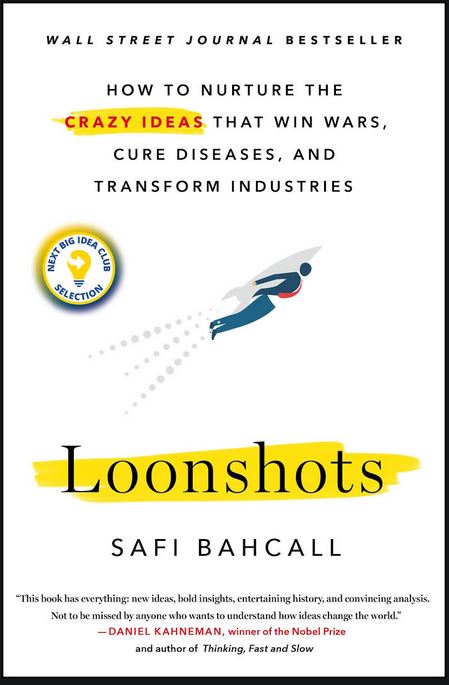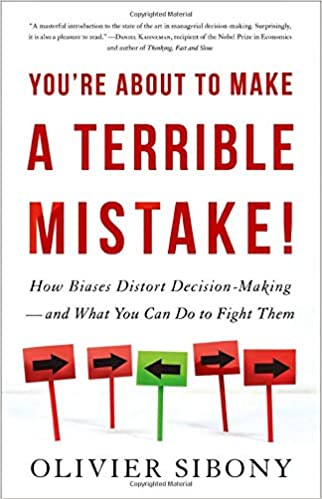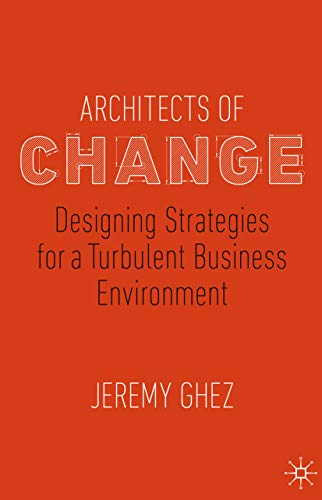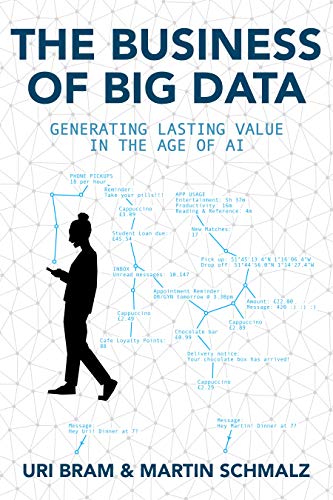After studying hard, the summer holidays are the perfect opportunity to relax and enjoy a well-earned break. One of the easiest—and most inexpensive! —ways of disconnecting from it all is having your imagination captured by a great book. We asked our HEC Paris professors for suggestions about what to read this summer. The result is a list of works that range from classical fiction to the most cutting-edge business guides.
The Business of Big Data: How To Create Lasting Value in the Age of AI, by Martin Schmalz and Uri Bram (2019)
Recommended by Christophe Spaenjers, Associate Professor of Finance
Professor Spaenjers says: The rise of big data and AI is one of the most important forces in today’s business landscape. This short book, co-authored by a finance professor at Oxford SBS, gives a clear and accessible (but not oversimplified) introduction to the “data economy.” It explains how businesses are collecting, analyzing and monetizing data—and delves into the relative strengths and weaknesses of human versus artificial intelligence. Highly recommended to everyone with an interest in learning how technology is changing our economy.
Le Petit Prince, by Antoine de Saint Exupéry (1943)
Recommended by Xavier Boute, Associate Professor of Economics and Decision Sciences
 Professor Boute says: Why this book? Firstly, it will help remind MBA students of what they learned in statistics class. Second, it’s the best way to practice a little French during this summer. But most importantly, after the strangeness of the last few months with COVID, summer is the best time for each of us to gain a new perspective on the world. Understanding the viewpoints of “la rose” (the rose), “le mouton” (the sheep) and “l’allumeur de réverbères” (the lamplighter) is a fun way to prepare for the Fall term! You might well find this book inspiring, with so many quotes (in French) to read, write, share and recite, as well as the sentiments the author expresses around the word “apprivoiser” (to tame).
Professor Boute says: Why this book? Firstly, it will help remind MBA students of what they learned in statistics class. Second, it’s the best way to practice a little French during this summer. But most importantly, after the strangeness of the last few months with COVID, summer is the best time for each of us to gain a new perspective on the world. Understanding the viewpoints of “la rose” (the rose), “le mouton” (the sheep) and “l’allumeur de réverbères” (the lamplighter) is a fun way to prepare for the Fall term! You might well find this book inspiring, with so many quotes (in French) to read, write, share and recite, as well as the sentiments the author expresses around the word “apprivoiser” (to tame).
Martin Eden, by Jack London (1909)
Recommended by Gonçalo Pacheco De Almeida, Professor of Strategy and Business Policy
 Professor Pacheco De Almeida says: Jack London is perhaps the greatest American writer of all time. Although famous for his best-selling classics for younger audiences such as The Call of the Wild (1903) and White Fang (1906), in 1909 Jack London published what may well be his best novel ever: Martin Eden. This book was written over a century ago; yet one can feel the heartbeat of the author on every page. The bare-knuckle, semi-autobiographical story of a sailor who pursues his dreams of literary fame is a powerful narrative that leaves the reader with a profound, thought-provoking message. In London’s own words: “One of my motifs, in this book, was an attack on individualism (in the person of the hero)”. This critique of individualism and personal ambition should reverberate today as the world comes to grips with a global crisis that can only be solved through coordinated collective effort and social inclusiveness.
Professor Pacheco De Almeida says: Jack London is perhaps the greatest American writer of all time. Although famous for his best-selling classics for younger audiences such as The Call of the Wild (1903) and White Fang (1906), in 1909 Jack London published what may well be his best novel ever: Martin Eden. This book was written over a century ago; yet one can feel the heartbeat of the author on every page. The bare-knuckle, semi-autobiographical story of a sailor who pursues his dreams of literary fame is a powerful narrative that leaves the reader with a profound, thought-provoking message. In London’s own words: “One of my motifs, in this book, was an attack on individualism (in the person of the hero)”. This critique of individualism and personal ambition should reverberate today as the world comes to grips with a global crisis that can only be solved through coordinated collective effort and social inclusiveness.
Through the Looking-Glass, and What Alice Found There, by Lewis Carroll (1945)
Recommended by Jeremy Ghez, Associate Professor of Economics and International Affairs
 Professor Ghez says: Alice goes back in Wonderland and finds out her most basic intuition is not always right and that in order to stay in position, she must run, fast. Even though the book was written a half-century ago, it is as if Lewis Carroll meant this book to be a metaphor for today’s business environment.
Professor Ghez says: Alice goes back in Wonderland and finds out her most basic intuition is not always right and that in order to stay in position, she must run, fast. Even though the book was written a half-century ago, it is as if Lewis Carroll meant this book to be a metaphor for today’s business environment.
Loonshots: How to Nurture the Crazy Ideas That Win Wars, Cure Diseases, and Transform Industries, by Safi Bahcall (2019)
Recommended by Olivier Sibony, Associate Professor of Strategy and Business Policy
 Professor Sibony says: One book I would definitely recommend to our MBA students is Loonshots. It is the best book I’ve read about innovation, how most organizations stifle it, and how to overcome the issues surrounding it.
Professor Sibony says: One book I would definitely recommend to our MBA students is Loonshots. It is the best book I’ve read about innovation, how most organizations stifle it, and how to overcome the issues surrounding it.
And we can’t overlook these two superb, recently published reads from our very own HEC Paris Professors
You’re About to Make a Terrible Mistake! How Biases Distort Decision-Making and What You Can Do to Fight Them, by Olivier Sibony (2020)
 Drawing on dozens of highly relevant–and often entertaining!–case studies, Professor Sibony’s book shows how biases continually lead us to make bad business decisions. To combat these pitfalls of cognitive bias, Professor Sibony proposes an effective decision-making architecture. He provides 40 simple, easy-to-implement techniques for business leaders to leverage the collective intelligence of its people and ultimately make the best decisions possible.
Drawing on dozens of highly relevant–and often entertaining!–case studies, Professor Sibony’s book shows how biases continually lead us to make bad business decisions. To combat these pitfalls of cognitive bias, Professor Sibony proposes an effective decision-making architecture. He provides 40 simple, easy-to-implement techniques for business leaders to leverage the collective intelligence of its people and ultimately make the best decisions possible.
“A masterful introduction to the state of the art in managerial decision making. Surprisingly, it is also a pleasure to read.”
— Daniel Kahneman, author of Thinking, Fast and Slow
“Finally! Actionable advice for leaders based on decades of decision science. Succinct, accurate, and even-handed. I loved it!”
―Angela Duckworth, bestselling author of Grit
Architects of Change: Designing Strategies for a Turbulent Business Environment, by Jeremy Ghez (2019)
 Professor Ghez leverages his deep understanding of economics and geopolitics to provide readers with the tools to develop an entrepreneurial mindset and build a a strategy to predict and effectively respond to future business trends. The book teaches you how to grasp, leverage and harness the dynamics that shape tomorrow’s markets, and provides a roadmap for reinventing the way you do business. Entertaining and well-written, the book is a must-read for anyone who wants “get beyond the buzz” and work for positive change.
Professor Ghez leverages his deep understanding of economics and geopolitics to provide readers with the tools to develop an entrepreneurial mindset and build a a strategy to predict and effectively respond to future business trends. The book teaches you how to grasp, leverage and harness the dynamics that shape tomorrow’s markets, and provides a roadmap for reinventing the way you do business. Entertaining and well-written, the book is a must-read for anyone who wants “get beyond the buzz” and work for positive change.
“It is common to hear that we are living in turbulent times: ones of anger and extremism. It is much less common to hear what to do about it. This book helps decision-makers move beyond the noise, arguing that they can be transformative even as private citizens. It pulls you away from ‘business as usual’ and empowers you to become an agent of change with the strategic tools necessary for success.”
―Greg Treverton, Former Chairman of the US National Intelligence Council

Recent Comments